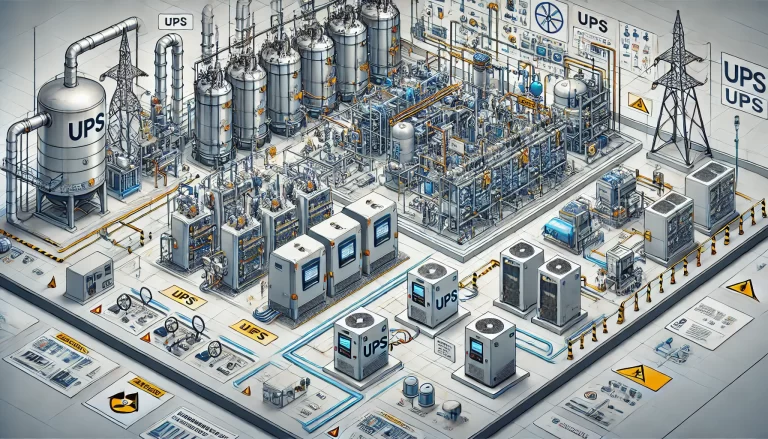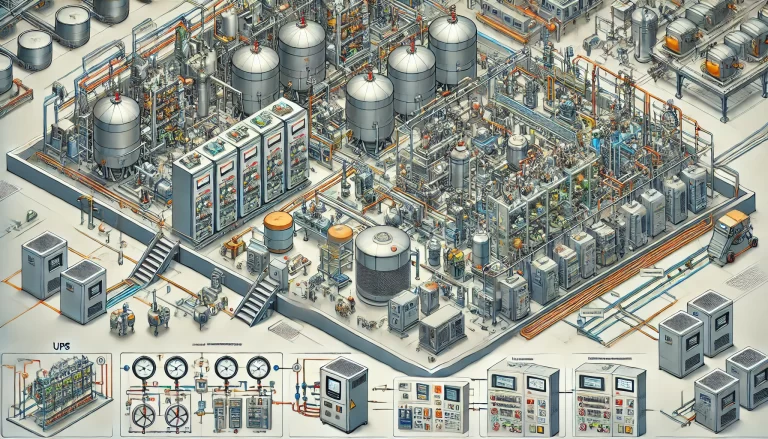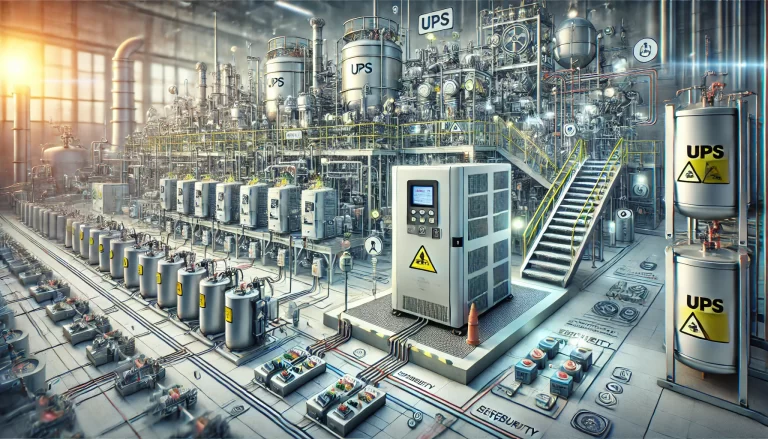The Uninterruptible Power Supply (UPS) plays a crucial role in automation equipment, especially within high-stakes environments like chemical plants. As a safeguard for automated control systems, the UPS ensures continuous power supply to critical equipment, even when external power sources are compromised. The performance and maintenance quality of the UPS directly impact the entire chemical plant’s safe and reliable operation. Inadequate maintenance or faulty operation of the UPS can lead to severe consequences, ranging from system shutdowns to catastrophic safety incidents. Thus, UPS maintenance is not merely important but vital, as it guarantees the power supply security of the entire system.

Role of UPS in Chemical Plant Operations
In a chemical plant, where automated systems control complex processes involving volatile substances, an uninterrupted power supply is essential for maintaining stable and safe operations. These systems monitor and regulate pressure, temperature, and other key parameters, ensuring safe production conditions. A sudden loss of power can disrupt these controls, potentially leading to uncontrolled reactions, overheating, or pressure buildups, any of which could result in explosions, toxic leaks, or other hazardous incidents.
A UPS serves as a backup power system that steps in when the main power source fails or becomes unstable, ensuring critical control systems continue to operate seamlessly. By switching to battery power instantly, the UPS provides enough time for the main power supply to recover or for emergency actions to be taken. This emergency support minimizes downtime, prevents system errors, and enhances the overall resilience of the plant’s operations.
Importance of UPS Quality and Maintenance
The reliability of the UPS system, however, is heavily dependent on its quality and maintenance. Chemical plants require an uninterrupted power supply with near-zero downtime, making the UPS system’s dependability paramount. Any failure in the UPS could lead to the malfunction of automation systems, impacting production and risking both personnel and environmental safety. Proper maintenance ensures that UPS components, like the batteries, inverters, and power conditioning units, function optimally, reducing the risk of unexpected breakdowns.
Routine maintenance, quality assurance, and continuous monitoring are therefore essential. These processes not only prolong the UPS’s operational life but also increase its efficiency and reliability, providing confidence in its ability to support the facility during power interruptions. Regular servicing helps prevent minor issues from escalating into larger, costlier problems and ensures compliance with safety and quality standards in a high-risk environment.

UPS Maintenance Best Practices for Enhanced Safety and Reliability
To ensure that UPS systems in chemical plants function reliably and remain ready to handle unexpected power failures, certain maintenance best practices should be established:
Scheduled Inspections and Testing: Develop a preventive maintenance schedule to routinely inspect UPS components. Key aspects of the UPS, such as the battery, rectifier, and inverter, should be tested regularly. During inspections, assess battery voltage levels, charge capacity, and connections, ensuring that the system can perform efficiently and smoothly under all conditions.
Detailed Logging and Analysis: After each inspection or maintenance activity, detailed records should be kept. These records should include any adjustments made, issues detected, and solutions implemented. Over time, this data provides insight into the UPS system’s behavior and enables predictive maintenance. Data trends can reveal when batteries are nearing the end of their useful life or when components require replacement.
Emergency Backup Plan and Response Training: Despite regular maintenance, having an emergency backup plan is crucial in the event of UPS failure. Equip the system with a secondary backup source or generator, if possible, and create a detailed response plan. Conduct periodic emergency drills to simulate power outages, allowing personnel to practice rapid responses and build confidence in handling real power disruptions safely and effectively.
Utilization of High-Quality Components: The reliability of the UPS system is also dependent on the quality of its individual components. High-quality batteries, cables, and other replacement parts may be more costly upfront but tend to offer longer operational life and higher reliability. Investing in premium components reduces the need for frequent replacements and the risk of early failure, especially in demanding environments like chemical processing.
Remote Monitoring and Diagnostics: Many modern UPS systems offer remote monitoring features that allow maintenance personnel to track performance metrics in real-time. Integrating remote diagnostics enables the early detection of potential issues, often before they can impact the plant’s operations. This capability can also reduce the need for on-site inspections and allow for quicker, data-driven maintenance decisions.
Benefits of Effective UPS Maintenance
Consistent and thorough maintenance of the UPS not only ensures a stable power supply but also delivers a host of benefits. By minimizing the risk of unexpected power disruptions, maintenance promotes operational stability, helping to avoid the costly consequences of plant downtime and unplanned repairs. Well-maintained UPS systems extend equipment lifespan, reduce maintenance costs, and ensure compliance with regulatory standards.
In the broader context of workplace safety, regular UPS maintenance reduces the likelihood of uncontrolled situations stemming from power loss. With the continuity of power to safety-critical systems, the risk of industrial incidents due to power loss is significantly reduced, making the plant safer for all personnel and surrounding communities.

Conclusion
In conclusion, the UPS system is integral to the safe and efficient operation of automated control systems in chemical plants. Its importance cannot be understated, as it underpins the stability of critical processes in hazardous environments. Quality maintenance practices are vital to uphold UPS performance, enabling it to fulfill its role as a reliable safeguard against power interruptions. By following best practices—regular testing, data logging, training, component quality control, and remote monitoring—plants can enhance the reliability of their UPS systems, ensuring consistent power supply, safe operation, and operational resilience.
